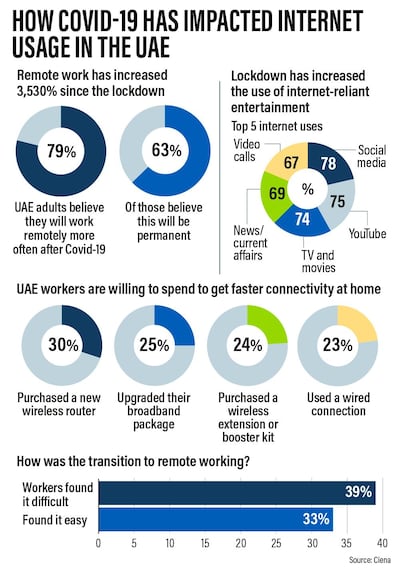Seventy-nine per cent of people in the UAE are expecting to work remotely more often even after the lifting of Covid-19 restrictions, and of those 63 per cent feel this will be permanent, according to a new survey that analysed the impact of the pandemic on work culture.
Meanwhile, 85 per cent of those surveyed are currently working from home, compared to just 2 per cent before movement restrictions were introduced in March, US-based telecommunications firm Ciena, which commissioned market research company Opinium to conduct the survey last month, said.
“The data overwhelmingly shows that the lines between our personal and professional lives are becoming increasingly blurred as we adapt to working from home more often,” Jamie Jefferies, Ciena's general manager and vice president for Europe, the Middle East and Africa, said.
“With more demand on our home broadband, we are looking to upgrade in every way we know how … all to make sure we have a good enough connection now and in the future,” he added.
The company said an increased reliance on home internet for remote working and other activities presents a “unique opportunity” for telcos.
The report, which surveyed 500 UAE adults on their internet habits and usage before and during the lockdown, found that they were reliant on home internet connections for much more than remote working.
About 67 per cent of those surveyed were making more video calls to connect with colleagues and friends, while 78 per cent were using social media more frequently and 74 per cent were watching more TV and movies online.
“Until now, high-speed broadband and bandwidth were primarily focused around urban areas … particularly in big cities, where there is a high density of businesses,” said Mr Jefferies, adding that with more people working remotely, network providers will need to change how they deliver connectivity to users.
Nearly three quarters of individuals surveyed have taken steps to improve their home internet to meet increased demand.
The most common changes included buying a new wireless router (30 per cent), upgrading a broadband package (25 per cent) and purchasing a wireless extension or booster kit (24 per cent).
The transition to remote working has evoked mixed responses, with nearly 39 per cent of workers admitting to finding the process difficult. This figure was lower for private sector workers (37 per cent) than for public sector employees (48 per cent).



